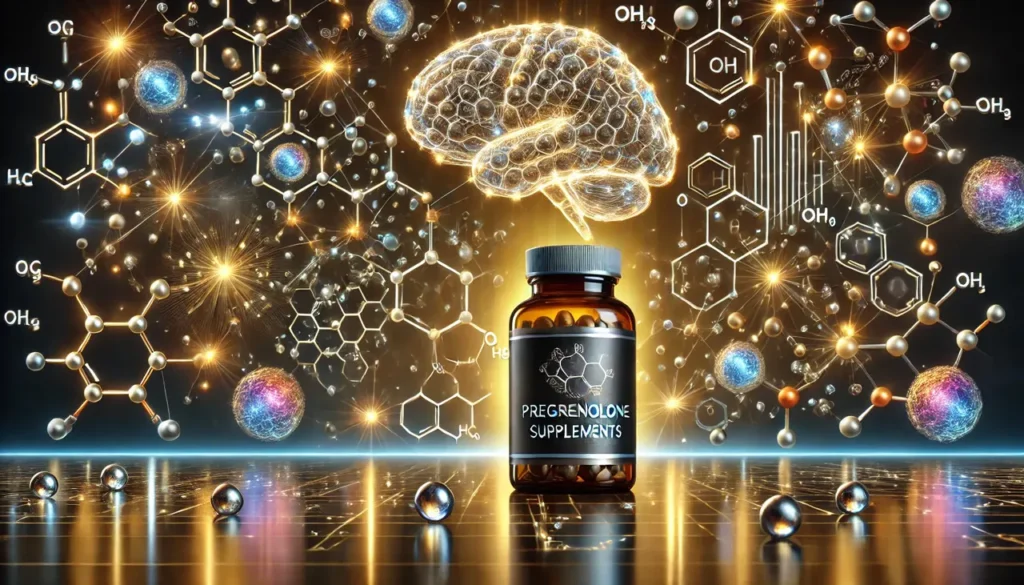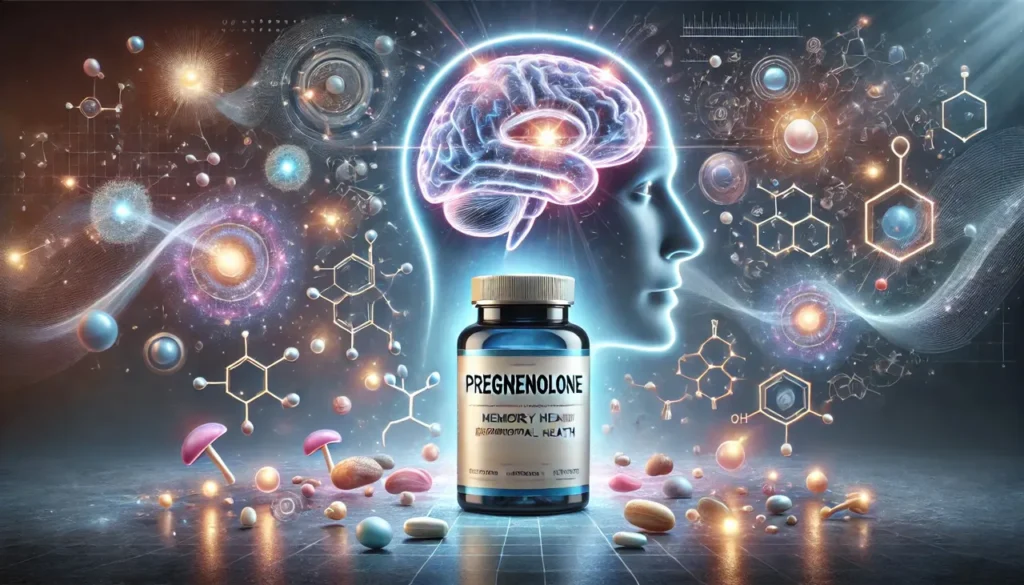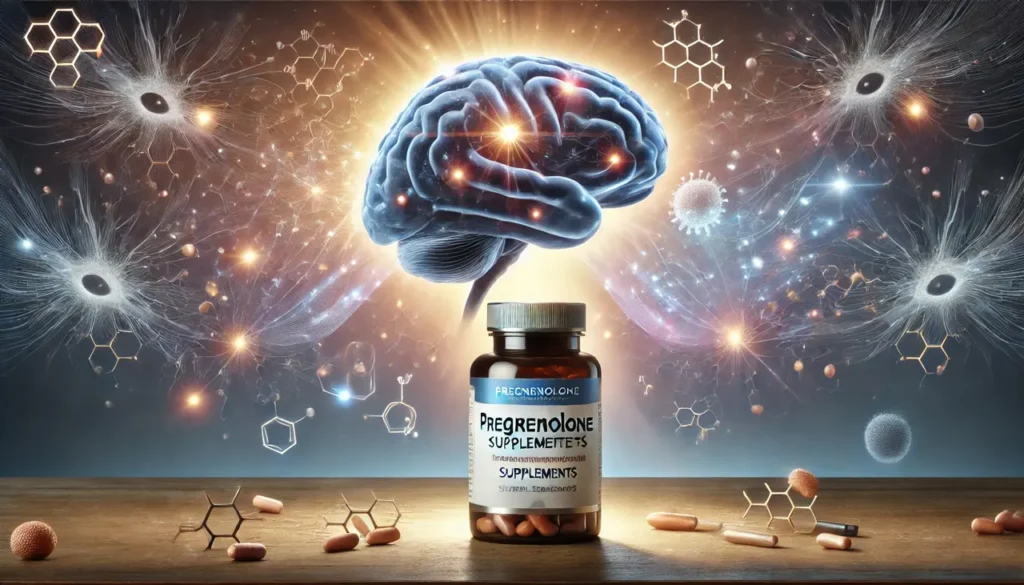Pregnenolone, a steroid hormone synthesized primarily in the adrenal glands, plays a crucial role in the production of other steroid hormones, including progesterone, cortisol, and testosterone. As a precursor to these hormones, pregnenolone has garnered interest in the realm of nootropic supplements due to its potential cognitive-enhancing properties. This article delves into the chemistry, physiological mechanisms, potential nootropic benefits, dosing guidelines, side effects, drug interactions, and other important considerations regarding pregnenolone supplementation.
You May Also Like:
Sources of Pregnenolone
Pregnenolone is naturally produced in the body from cholesterol through enzymatic conversion. While it is not typically obtained directly from dietary sources, certain foods may support its endogenous production by providing the necessary substrates. These include:
- Healthy Fats: Foods rich in cholesterol, such as egg yolks and fatty fish, can provide the raw materials necessary for pregnenolone synthesis.
- Vegetables: Leafy greens, cruciferous vegetables, and avocados contain phytosterols that may support hormone production.
- Proteins: Adequate protein intake is vital for the synthesis of enzymes involved in hormone production, including pregnenolone.
For those seeking to increase their pregnenolone levels, supplementation is often considered, particularly in light of the hormone’s declining production with age.
Support Cognitive Function and Mental Clarity with Pregnenolone Supplements—Order Now on Amazon!

Chemistry of Pregnenolone
Chemically, pregnenolone is classified as a steroid hormone. Its molecular formula is C21H32O2, and it has a structure characterized by four fused hydrocarbon rings, typical of steroid compounds. Pregnenolone serves as a precursor to numerous steroid hormones, facilitated through various enzymatic pathways, primarily involving the cytochrome P450 enzyme system.
Pregnenolone can be converted into several hormones:
- Progesterone: Converted from pregnenolone via the action of the enzyme 3β-hydroxysteroid dehydrogenase (3β-HSD).
- Cortisol and Corticosterone: Synthesized in the adrenal cortex, with pregnenolone playing a vital role in the stress response.
- Testosterone and Estrogen: These sex hormones are produced through pathways involving pregnenolone and its derivatives, influencing numerous physiological functions, including libido, mood, and cognitive performance.
The intricate biochemical pathways surrounding pregnenolone metabolism underscore its potential significance for both endocrine health and cognitive function.

Physiological Mechanisms of Pregnenolone in the Body and Brain
Pregnenolone’s influence on cognitive function can be attributed to several physiological mechanisms, including its effects on neurotransmitter systems, neuroprotection, and neuroplasticity:
- Modulation of Neurotransmitter Systems: Pregnenolone is known to influence the synthesis and activity of neurotransmitters, particularly gamma-aminobutyric acid (GABA) and glutamate. By modulating GABA receptors, pregnenolone may promote relaxation and reduce anxiety. Conversely, its impact on glutamatergic transmission could enhance synaptic plasticity, which is vital for learning and memory.
- Neuroprotective Effects: Pregnenolone exhibits neuroprotective properties, potentially mitigating the effects of oxidative stress and neuroinflammation. Research indicates that pregnenolone may protect neurons from excitotoxic damage and promote the survival of neuronal cells in adverse conditions, thus supporting overall brain health.
- Enhancement of Neuroplasticity: Neuroplasticity—the brain’s ability to reorganize itself by forming new neural connections—is crucial for learning and memory. Pregnenolone has been shown to enhance neurogenesis and synaptic plasticity, which may facilitate cognitive enhancement and improve memory retention.
- Mood Regulation: By influencing hormonal balance and neurotransmitter systems, pregnenolone may contribute to mood regulation and overall mental well-being. Some studies suggest that it may alleviate symptoms of anxiety and depression, providing a potential therapeutic avenue for individuals experiencing mood disorders.
Improve Memory, Focus, and Cognitive Performance with Pregnenolone—Shop Amazon’s Best!

Nootropic Benefits of Pregnenolone
The exploration of pregnenolone as a nootropic supplement stems from its multifaceted effects on cognitive function. While more research is necessary, several potential benefits have been identified:
- Cognitive Enhancement: Pregnenolone may improve various aspects of cognitive function, including memory, focus, and learning ability. By supporting neurotransmitter balance and promoting neuroplasticity, it may enhance the brain’s capacity to process and retain information. Additionally, research indicates that pregnenolone may influence synaptic transmission, potentially leading to quicker cognitive processing. This acceleration in mental agility may be particularly beneficial in environments requiring rapid decision-making and problem-solving skills.
- Stress Resilience: As a precursor to stress-related hormones such as cortisol, pregnenolone may help the body adapt to stressors. This adaptability could contribute to improved cognitive performance under pressure, potentially enhancing mental clarity and decision-making. Moreover, by promoting a balanced hormonal response to stress, pregnenolone may mitigate the negative consequences of chronic stress, such as fatigue and burnout. Ultimately, this stress resilience can support an individual’s overall emotional well-being and facilitate better coping mechanisms during challenging situations.
- Mood Stabilization: Pregnenolone’s ability to influence GABA and glutamate levels suggests that it may help stabilize mood, reducing anxiety and depressive symptoms. Improved mood can enhance cognitive performance, creating a positive feedback loop that further supports brain health. Furthermore, pregnenolone’s impact on neurotransmitter regulation may help mitigate the emotional fluctuations associated with mood disorders, allowing for a more consistent emotional state. This stability can foster an environment conducive to creativity and productivity, enabling individuals to engage more fully in their personal and professional pursuits.
- Neuroprotection: By protecting neurons from oxidative damage and excitotoxicity, pregnenolone may help maintain cognitive function as individuals age. This neuroprotective role is particularly important in the context of age-related cognitive decline and neurodegenerative diseases. Research suggests that pregnenolone can stimulate the production of neurotrophic factors, which are essential for neuronal survival and growth. Additionally, its ability to enhance mitochondrial function may further contribute to cellular energy production, promoting overall brain health and resilience against neurodegenerative processes.

Dosage and Supplementation Guidelines
Determining the appropriate dosage of pregnenolone is essential for maximizing its benefits while minimizing potential side effects. The effective dosage may vary based on individual needs, health status, and specific cognitive goals. General guidelines for pregnenolone supplementation include:
- Typical Dosage Range: The commonly recommended dosage of pregnenolone ranges from 10 to 50 mg per day. For those seeking cognitive enhancement, starting with a lower dose (10-25 mg) and gradually increasing based on individual response is advisable.
- Therapeutic Use: Some studies have employed higher doses, ranging from 50 to 300 mg daily, for specific therapeutic purposes, including mood enhancement and cognitive support in neurodegenerative conditions. However, higher doses should only be undertaken under medical supervision.
- Supplement Forms: Pregnenolone supplements are available in various forms, including capsules, tablets, and powders. Selecting a reputable brand that adheres to quality standards is crucial for ensuring product safety and efficacy.
- Timing of Administration: Pregnenolone can be taken with or without food, but some individuals may prefer taking it in the morning to align with natural hormonal fluctuations. Consistency in timing may help maintain stable levels in the body.
Experience the Cognitive Benefits of Pregnenolone for Mental Clarity and Focus—Order Now on Amazon!

Side Effects and Safety
While pregnenolone is generally well-tolerated, some individuals may experience side effects, particularly at higher doses. Common side effects include:
- Hormonal Imbalances: As a steroid precursor, excessive pregnenolone supplementation may lead to hormonal imbalances, manifesting as changes in mood, libido, or menstrual irregularities in women.
- Drowsiness or Fatigue: Some users may report feelings of drowsiness or fatigue, especially when starting supplementation. Adjusting the dosage or timing of administration may help mitigate these effects.
- Headaches: Pregnenolone has been associated with headaches in some individuals, potentially linked to its impact on neurotransmitter levels. Monitoring dosage and individual response is advisable.
- Potential Interactions: Pregnenolone may interact with certain medications, particularly those affecting hormonal balance. Individuals taking medications for hormonal disorders or those with a history of hormone-sensitive conditions should consult a healthcare professional before starting supplementation.
Interactions with Other Supplements and Medications
Understanding potential interactions between pregnenolone and other substances is essential for safe supplementation. Key interactions include:
- Hormonal Medications: Pregnenolone may influence the effectiveness of hormonal medications, including oral contraceptives and hormone replacement therapies. Individuals taking these medications should consult their healthcare provider to ensure safe usage.
- Nootropics and Cognitive Enhancers: Pregnenolone can be combined with other nootropic supplements to enhance cognitive function. However, individuals should monitor their responses, particularly when combining it with stimulants, as excessive stimulation may lead to adverse effects.
- Medications for Mental Health Disorders: Pregnenolone may interact with medications used to treat anxiety, depression, or mood disorders. Patients should discuss potential interactions with their healthcare provider to ensure safe and effective treatment.
Risks for Individuals with Certain Health Conditions
While pregnenolone is safe for many individuals, specific health conditions may warrant caution:
- Hormone-Sensitive Conditions: Individuals with a history of hormone-sensitive cancers (e.g., breast or prostate cancer) should exercise caution when considering pregnenolone supplementation due to its role as a steroid precursor.
- Adrenal Disorders: Those with adrenal insufficiency or other adrenal disorders should consult their healthcare provider before using pregnenolone, as supplementation may influence hormone levels and exacerbate underlying conditions.
- Pregnancy and Lactation: The safety of pregnenolone supplementation during pregnancy and breastfeeding has not been well studied. Women who are pregnant or nursing should avoid supplementation unless directed by a healthcare professional.

Conclusion: Should You Consider Pregnenolone as a Nootropic?
Pregnenolone’s role as a precursor to various steroid hormones and its potential effects on cognitive function position it as a promising candidate for nootropic supplementation. Its multifaceted actions on neurotransmitter systems, neuroprotection, and stress resilience underscore its potential to enhance cognitive performance, improve mood, and promote overall brain health. However, more research is necessary to fully elucidate its efficacy as a nootropic and establish optimal dosing guidelines.
As with any supplement, individuals considering pregnenolone should consult with a healthcare professional before starting supplementation, particularly if they have pre-existing health conditions or are taking medications that may interact with this hormone. By maintaining adequate levels of pregnenolone through diet or supplementation, individuals may support their cognitive function and overall mental well-being, unlocking the potential for enhanced cognitive performance and resilience in the face of life’s challenges.

References:
- The neurosteroid pregnenolone promotes degradation of key proteins in the innate immune signaling to suppress inflammation. Retrieved from: https://pmc.ncbi.nlm.nih.gov/articles/PMC6433066/
- Pregnenolone – An Overview. Retrieved from: https://www.sciencedirect.com/topics/biochemistry-genetics-and-molecular-biology/pregnenolone
- The Health Benefits of Pregnenolone. Retrieved from: https://www.verywellmind.com/the-lowdown-on-pregnenolone-89502
- Pregnenolone: A ‘Prohormone’ that May Help Relieve Depression. Retrieved from: https://draxe.com/nutrition/pregnenolone/
Important Note: The information contained in this article is for general informational purposes only, and should not be construed as health or medical advice, nor is it intended to diagnose, prevent, treat, or cure any disease or health condition. Before embarking on any diet, fitness regimen, or program of nutritional supplementation, it is advisable to consult your healthcare professional in order to determine its safety and probable efficacy in terms of your individual state of health.
Regarding Nutritional Supplements Or Other Non-Prescription Health Products: If any nutritional supplements or other non-prescription health products are mentioned in the foregoing article, any claims or statements made about them have not been evaluated by the U.S. Food and Drug Administration, and such nutritional supplements or other health products are not intended to diagnose, treat, cure, or prevent any disease.


